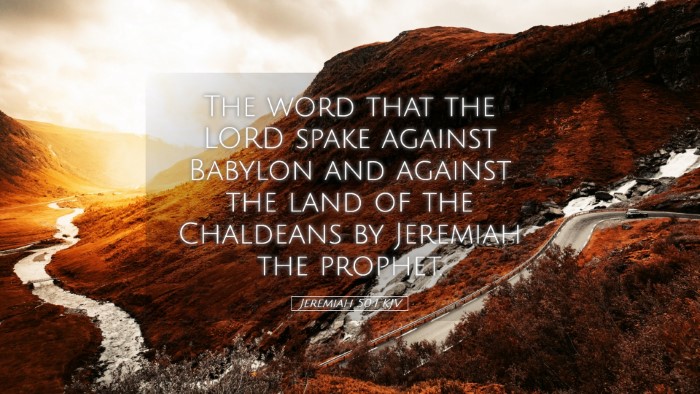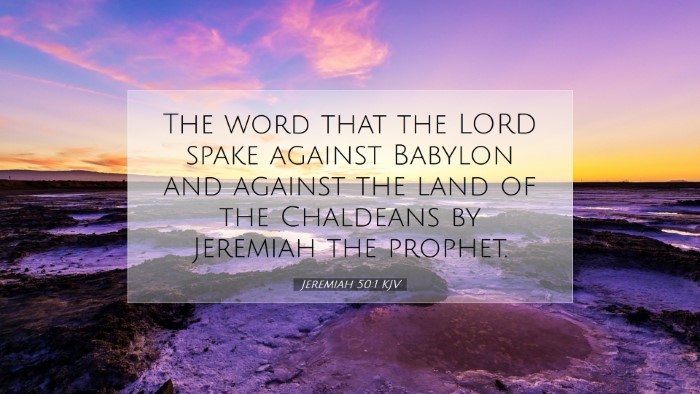Commentary on Jeremiah 50:1
Verse Context: Jeremiah 50:1 reads: "The word that the Lord spoke against Babylon and against the land of the Chaldeans by Jeremiah the prophet." This verse serves as an introduction to the prophecies regarding Babylon's impending judgment and destruction. The emphasis here is on God's sovereign authority over nations and the divine will that brings about judgment.
Insights from Matthew Henry
Matthew Henry's Commentary emphasizes the significance of this prophecy in the larger context of God's plan for His people. He states that although Babylon was a powerful empire, its fall was certain because it was under God's judgment.
- The Sovereignty of God: Henry notes that the very mention of Babylon signifies its impending doom, showing that God rules over even the mightiest of nations. He reminds readers that the divine word, delivered by the prophet Jeremiah, underscores the certainty of God's purposes.
- Prophetic Clarity: The clarity with which Jeremiah pronounces God's message reflects the urgency and importance of repenting from sinful ways. Believers are warned about the consequences of national sin, especially under the influence of powerful yet corrupt leaders.
- The Role of the Prophet: Henry highlights the role of Jeremiah as a prophet who delivers divine messages, illustrating that true prophets act as God's mouthpieces, warning nations of their impending judgment.
Insights from Albert Barnes
Albert Barnes' Notes delves into the historical and theological implications of this text. He articulates the significant role Babylon plays in biblical history and prophecies.
- Historical Context: Barnes connects this prophecy to the historical context of Israel's captivity in Babylon, emphasizing that Babylon’s downfall was not just a national event but also a pivotal moment for the restoration of Israel.
- Theological Implications: He points out that God’s judgment against Babylon serves as a reminder of His justice and the inevitable consequence of sin within nations. The repetition of divine pronouncement signifies the seriousness of His judgment.
- Future Relevance: Barnes also suggests that this prophecy holds future relevance, symbolizing the ultimate triumph of God's kingdom over all earthly powers represented by Babylon.
Insights from Adam Clarke
Adam Clarke's Commentary provides a scholarly exploration of the text, enhancing the understanding of the prophetic declaration.
- Interpretation of 'Chaldeans': Clarke highlights the term 'Chaldeans' as representative of the elite within the Babylonian empire, emphasizing that the judgment is directed not just at the city but at the entire socio-political structure.
- Symbolism of Babylon: He refers to Babylon as a type of the world systems opposed to God, stressing that its fall symbolizes the collapse of any empire that stands in opposition to God’s covenant people.
- Encouragement to the Exiled: Clarke also suggests that this prophecy served as encouragement to the exiles in Babylon, signalling that their oppression would soon end and that they would be restored to their homeland.
Application for Pastors and Theologians
This verse offers profound insights for pastors and theologians in various spheres:
- Divine Justice: The passage underscores the assurance of divine justice. Pastors can utilize this text to remind congregations that God’s judgment is not arbitrary but a response to national sin and moral decay.
- Encouragement in Suffering: For those facing trials, the prophecies against Babylon can provide hope that God sees injustice and will act on behalf of His people.
- The Role of the Church: The church, as a modern-day prophetic voice, is called to speak against injustice and corruption, echoing the sentiments of Jeremiah amidst societal challenges.
Conclusion
In conclusion, Jeremiah 50:1 serves as a pivotal introduction to the themes of judgment, restoration, and hope. Through the insights from Henry, Barnes, and Clarke, we grasp the significance of this prophecy not only within its historical context but also its implications for contemporary faith communities.


